Films with theme "Films about capital punishment", sorted by revenue
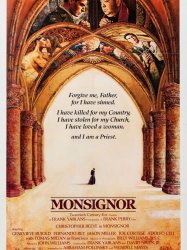
Monsignor (1982)
, 2h1Directed by Frank Perry
Origin USA
Genres Drama, War, Crime
Themes Films about religion, Films about capital punishment, Children's films
Actors Christopher Reeve, Geneviève Bujold, Fernando Rey, Jason Miller, Joseph Cortese, Adolfo Celi
With the Vatican having financial difficulties during World War II, a young priest from America is sent for, recommended because of his accounting skill.
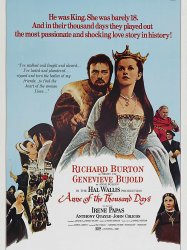
Anne of the Thousand Days (1969)
, 2h25Directed by Charles Jarrott
Origin United-kingdom
Genres Drama, Biography, Historical, Romance
Themes Politique, Political films, Films about capital punishment, Films based on plays, Films about royalty
Actors Richard Burton, Geneviève Bujold, Anthony Quayle, John Colicos, Irène Papas, Michael Hordern
The film begins in 1536 when Henry VIII (Richard Burton) considers whether or not he should sign the warrant for the execution of his second wife, Anne Boleyn: then, in a long flashback which takes up virtually the entire film, the whole truth is revealed. Starting in 1527, Henry has a problem: he reveals his dissatisfaction with his wife, Catherine of Aragon (Irene Papas). He is currently enjoying a discreet affair with Mary Boleyn, a daughter of Sir Thomas Boleyn who is one of his courtiers; but the King is bored with her too. At a court ball, he notices Mary's 18-year-old sister Anne (Geneviève Bujold), who has just returned from her education in France. She is engaged to the son of the Earl of Northumberland and they have received their parents' permission to marry. The King, however, is enraptured with Anne's beauty and orders his Lord Chancellor, Cardinal Wolsey, to break up the engagement.

I Want to Live! (1958)
, 2hDirected by Robert Wise
Origin USA
Genres Drama, Crime
Themes Prison films, Films about capital punishment
Actors Susan Hayward, Simon Oakland, Theodore Bikel, Virginia Vincent, Wesley Lau, Philip Coolidge
The film tells the story of the life and execution of Barbara Graham (Hayward) a prostitute and convicted perjurer. Graham is the product of a broken home, and works luring men into fixed card games.
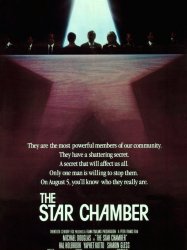
The Star Chamber (1983)
, 1h49Directed by Peter Hyams
Origin USA
Genres Drama, Thriller, Action, Crime
Themes Prison films, Serial killer films, Films about capital punishment, Children's films
Actors Michael Douglas, Hal Holbrook, Yaphet Kotto, Sharon Gless, Larry Hankin, James Sikking
Judge Steven Hardin (Michael Douglas) is an idealistic Los Angeles jurist who gets frustrated when the technicalities of the law prevent the prosecution of two men who are accused of raping and killing a 10-year-old boy. They were driving slowly late at night and attracted the suspicion of two police officers, who wondered if the van's occupants might be burglars. After checking the license plate for violations, the policemen pulled them over for expired paperwork, claimed to have smelled marijuana, then saw a bloody shoe inside the van. However, the paperwork was actually submitted on time (it was merely processed late), meaning the police had no reason to pull over the van and Hardin has no choice (see fruit of the poisonous tree) but to throw out any subsequently discovered evidence, i.e. the bloody shoe. Hardin is even more distraught when the father of the boy attempts to shoot the criminals in court but misses and shoots a cop instead. Subsequently, the father commits suicide while in jail only after he informs Hardin that another boy has been discovered raped and murdered and tells him "This one is on you, your Honor. That boy would be alive if you hadn't let those men go." After hearing all this, Judge Hardin approaches his friend, Judge Caulfield (Hal Holbrook), who tells him of a modern-day Star Chamber: a group of judges who identify criminals who fell through the judicial system's cracks and then take actions against them outside the legal structure.
 , 1h53
, 1h53Directed by Tay Garnett
Origin USA
Genres Drama, Thriller, Noir, Crime, Romance
Themes Films about sexuality, Films about capital punishment
Actors Lana Turner, John Garfield, Cecil Kellaway, Hume Cronyn, Leon Ames, Audrey Totter
Frank Chambers (John Garfield) is a drifter who stops at a rural diner for a meal and ends up working there. The diner is operated by a beautiful young woman, Cora Smith (Lana Turner), and her much older husband, Nick (Cecil Kellaway).

Mutiny on the Bounty (1935)
, 2h35Directed by Frank Lloyd, J. Walter Ruben
Origin USA
Genres Drama, Action, Adventure, Historical, Romance
Themes Seafaring films, Transport films, Films about capital punishment
Actors Charles Laughton, Clark Gable, Franchot Tone, Movita Castaneda, Mamo Clark, Donald Crisp
HMS Bounty leaves England in 1787 on a two-year voyage over the Pacific Ocean. The ship's captain, William Bligh (Charles Laughton), is a brutal tyrant who routinely administers harsh punishment to officers and crew alike who lack discipline, cause any infraction on board the ship, or in any manner defy his authority. Fletcher Christian (Clark Gable), the ship's lieutenant, is a formidable yet compassionate man who disapproves of Bligh's treatment of the crew. Roger Byam (Franchot Tone) is an idealistic midshipman who is divided between his loyalty to Bligh, owing to his family's naval tradition, and his friendship with Christian.
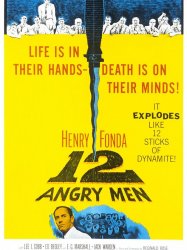
12 Angry Men (1957)
, 1h35Directed by Sidney Lumet
Origin USA
Genres Drama, Crime
Themes Assassinat, L'action se déroule en une journée, Théâtre, Films about capital punishment, Films based on plays
Actors Henry Fonda, Lee J. Cobb, E. G. Marshall, Martin Balsam, Jack Warden, John Fiedler
The story begins in a New York City courtroom, where an 19-year-old boy from a slum is on trial for allegedly stabbing his father to death. Final closing arguments are presented, and the judge then instructs the jury to decide whether the boy is guilty of murder. The judge further informs them that a guilty verdict will be accompanied by a mandatory death sentence.
 , 2h6
, 2h6Directed by John Huston
Origin USA
Genres Drama, Action, Adventure, Western
Themes Films about capital punishment, L'Or
Actors Humphrey Bogart, Walter Huston, Tim Holt, Bruce Bennett, Barton MacLane, Alfonso Bedoya
In 1925 in the Mexican oil-town of Tampico, Dobbs (Humphrey Bogart) and Curtin (Tim Holt), two Americans cheated out of promised wages and down on their luck, meet old prospector Howard (Walter Huston). When one of them wins a small jackpot in the lottery, they have the bankroll to finance a gold prospecting journey to the remote Sierra Madre mountains.
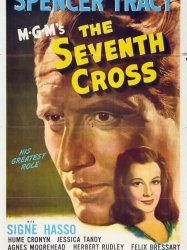
The Seventh Cross (1944)
, 1h50Directed by Fred Zinnemann, Andrew Marton
Origin USA
Genres Drama, War, Thriller
Themes Political films, Films about capital punishment
Actors Spencer Tracy, Signe Hasso, Hume Cronyn, Jessica Tandy, Agnes Moorehead, Herbert Rudley
The year is 1936. The film is narrated by Wallau (Ray Collins). Seven prisoners escape from the fictitious Westhofen concentration camp near Worms, Germany near the Rhine. They represent a cross-section of German society: a writer, a circus performer, a schoolmaster, a farmer, a Jewish grocery clerk, and two prisoners who are apparently political activists. One is George Heisler (Tracy) and the other his mentor Wallau (Collins), the leader of the group.

Birdman of Alcatraz (1962)
, 2h23Directed by John Frankenheimer
Origin USA
Genres Drama, Biography, Historical, Crime
Themes Prison films, Films about capital punishment, Se déroulant à Alcatraz
Actors Burt Lancaster, Karl Malden, Thelma Ritter, Neville Brand, Telly Savalas, Edmond O'Brien
Robert Stroud (Lancaster) is imprisoned as a young man for committing a murder in Alaska. He is shown as a rebellious inmate, fighting against a rigid prison system: on his way to jail by train he breaks open the window to allow the suffocating inmates to breathe. His rebellious attitude puts him in conflict with Harvey Shoemaker (Malden), the warden of Leavenworth Prison.

Dial M for Murder (1954)
, 1h45Directed by Alfred Hitchcock
Origin USA
Genres Drama, Thriller, Crime
Themes Assassinat, Films about sexuality, Théâtre, Films about capital punishment, Films based on plays
Actors Ray Milland, Grace Kelly, Robert Cummings, John Williams, Anthony Dawson, Patrick Allen
Tony Wendice (Ray Milland), an ex-professional tennis player, lives in a ground floor flat with his socialite wife, Margot (Grace Kelly). Tony retired after Margot complained about his busy schedule and she began an affair with American crime-fiction writer Mark Halliday (Robert Cummings), which Tony secretly discovered. Tony devises a plan to have Margot murdered.

Guilty (2011)
, 1h42Directed by Vincent Garenq
Origin France
Genres Drama, Crime
Themes Films about children, Prison films, Films about sexuality, Films about suicide, Films about pedophilia, Films about capital punishment
Actors Philippe Torreton, Noémie Lvovsky, Vladimir Yordanoff, Raphaël Ferret, Michelle Goddet, Olivier Claverie
Le film raconte l'histoire d'Alain Marécaux, un des accusés de l'affaire d'Outreau.
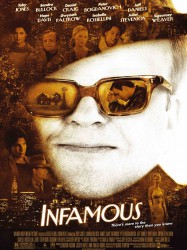
Infamous (2006)
, 2h1Directed by Douglas McGrath
Origin USA
Genres Drama, Biography, Crime
Themes Films about writers, Films about sexuality, LGBT-related films, Films about capital punishment, LGBT-related films, LGBT-related film
Actors Toby Jones, Sandra Bullock, Daniel Craig, Peter Bogdanovich, Jeff Daniels, Hope Davis
Truman Capote, known in New York City society for his wit and fashion flair as much as he is recognized in literary circles as the celebrated writer of Other Voices, Other Rooms and Breakfast at Tiffany's, reads a brief article about the murder of a farming family in Holcomb, Kansas, in the back pages of the New York Times of November 16, 1959.
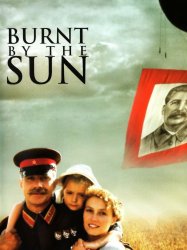
Burnt by the Sun (1994)
, 2h28Directed by Nikita Mikhalkov
Origin Russie
Genres Drama, Comedy, Historical
Themes Films about families, Politique, Prison films, Films about suicide, Political films, Films about capital punishment
Actors Oleg Menshikov, Ingeborga Dapkūnaitė, Nikita Mikhalkov, Nadejda Mikhalkova, Inna Oulianova, André Oumansky
The Soviet Union, summer 1936. Comdiv Sergei Petrovich Kotov, his wife Maroussia (Ingeborga Dapkūnaitė), and their young daughter Nadia are relaxing in a banya, when they are suddenly interrupted. A peasant from the local collective farm explains that the Soviet Army's tanks are about to crush the wheat harvest as part of general maneuvers. Although annoyed to be bothered during his vacation, Kotov rides on horseback to where the tank crews are confronting outraged peasants.
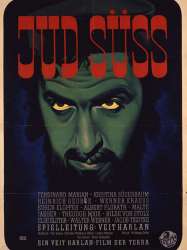
Süss, the Jew (1940)
, 1h36Directed by Veit Harlan
Genres Drama, Historical
Themes Politique, Films about religion, Political films, Films about capital punishment, Films about Jews and Judaism
Actors Ferdinand Marian, Werner Krauss, Heinrich George, Kristina Söderbaum, Eugen Gottlob Klöpfer, Bernhard Goetzke
The film begins with the coronation of Karl Alexander, Duke of Württemberg (Heinrich George), a man much beloved by his people, who swears an oath to obey the laws of the dukedom "according to the traditional Württemberg loyalty and honesty." However, the Duke soon becomes frustrated because the Württemberg Diet (the provincial council) refuses him the funds needed to maintain a lifestyle comparable to his neighboring sovereigns; in particular, he wants a personal bodyguard, an opera company, and a ballet company. Lacking funds even to purchase coronation gifts for the Duchess (Hilde von Stolz), the Duke sends a courtier to Frankfurt to borrow money from Joseph Süß Oppenheimer (Ferdinand Marian). Süß shows the emissary jewels and jewelry that are obviously beyond the Duke's means and then says that it would be his honor to provide the Duke with jewelry at a substantial discount. However, Süß insists on presenting the items to the Duke personally despite a ban against Jews (Judenbann) entering the city that has been in force for over a century. Armed with a pass from the Duke, Süß cuts his hair, shaves his beard, and dons "Christian" clothes so that he can enter Württemberg disguised as a Christian. As his carriage gets into an accident, Süß gets a lift from Dorothea Sturm (Kristina Söderbaum) to the city.
 Connection
Connection